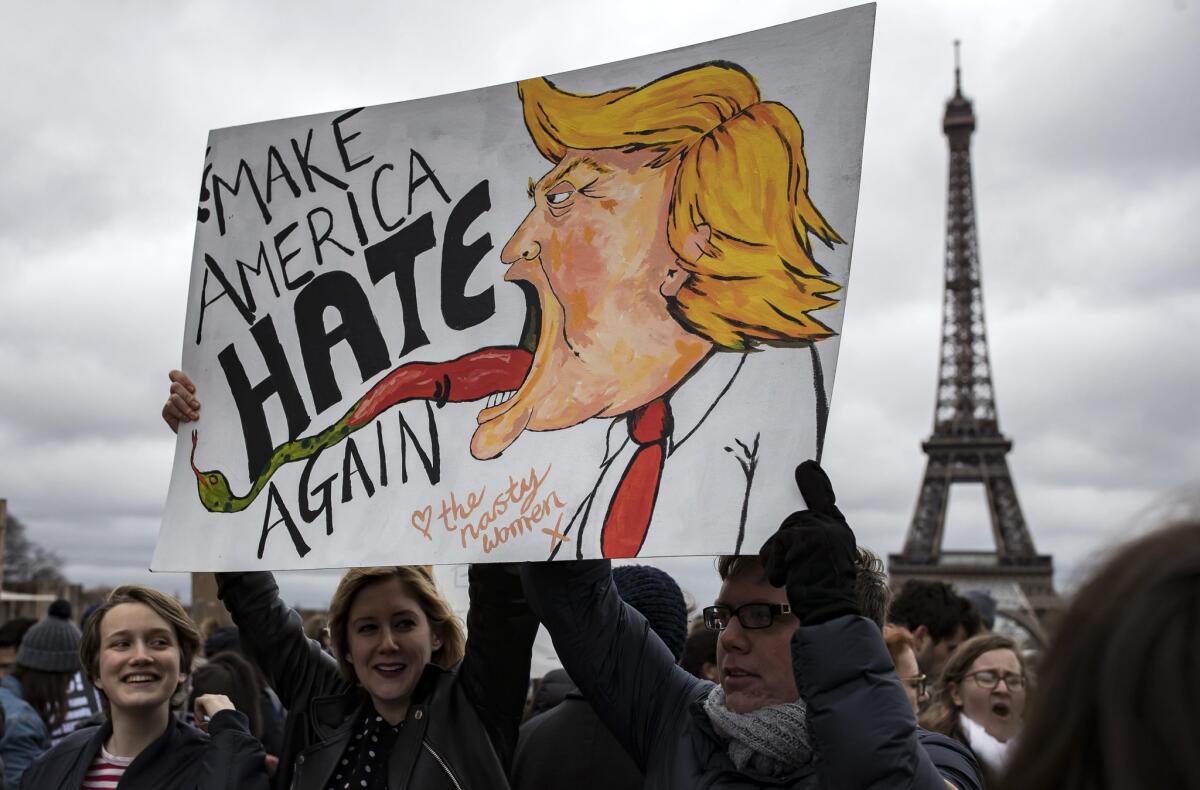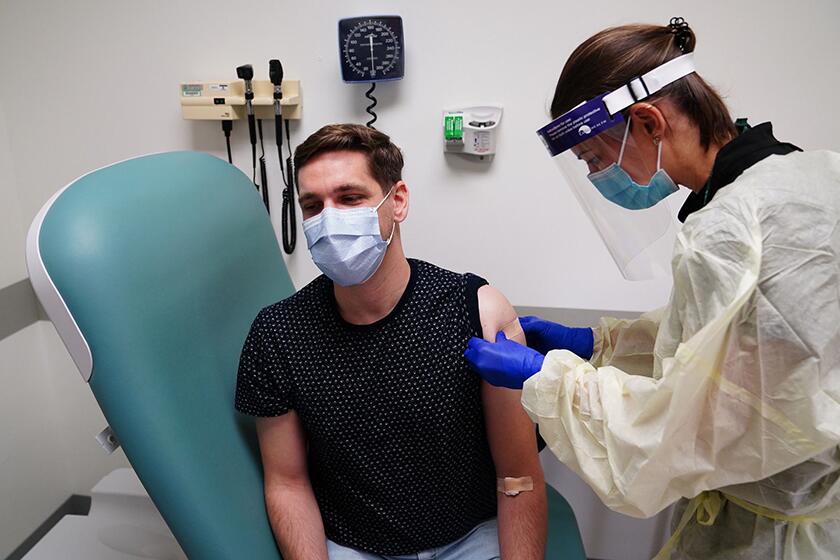Opinion: U.S.’ stunning decline five years after Paris

- Share via
Good morning. I’m Paul Thornton, and it is Saturday, Dec. 12, 2020. The Paris climate agreement turns five years old today (yes, it still exists). Let’s take a look back at the week in Opinion.
Five years seems like an awfully long way to look back, but it’s useful to recall the cautious optimism we felt in 2015 as the world agreed in principle that nations needed to act in the collective interest and cut greenhouse gas emissions. As The Times’ editorial board noted, the commitments made then were not nearly enough to limit global warming to 2 degrees Celsius above preindustrial levels, above which, scientists warn, such warming could wreak havoc on humanity. But the framework represented the best possibility for taking the action needed to sustain civilization on Earth.
Today, the situation globally (and in the United States especially) has deteriorated, and not just on climate change. In the first year of his presidency, Donald Trump indicated he would pull the U.S. out of the Paris agreement, based on his misguided, zero-sum view of acting for America’s benefit. It was a grim indication of where we were headed on anything having to do with science and the public’s interest.
Now, at the end of Trump’s presidency, the state of affairs on COVID-19 is almost hopeless (I know, vaccines are on the way). The question of whether to keep restaurants open as coronavirus deaths hit new records and local hospitals careen toward collapse is actually a highly personal, acrimonious political debate. (It doesn’t have to be, but the lack of federal financial relief makes it so.) Separate from the pandemic, the president and even mainstream Republicans have waged a futile but dangerous attack on the republic by seeking to nullify the will of 81.3 million voters and counting. (The Supreme Court threw out their last-chance lawsuit Friday.)
And all this happened in five years. Now, the president does not lead a vacuum, and there was plenty of moral and political rot in this country for Trump to feast on the moment he became president. But lurching from a position of global and scientific leadership on climate change in 2015 to the pitiable public health pariah we are now proves that the person who is actually president matters. Thankfully, it seems voters in 2020 got that message.
Why do so many people want to believe the election was stolen? For me, the indelible image from the 2020 election came from Wayne County, Mich., where a day after the vote a crowd of mostly white Trump supporters converged on largely Black election workers in Detroit to try to stop ballots from being counted. It was a sadly perfect display of what was at stake. Race and racism as animating forces in the election conspiracy theories were left out of an op-ed article by two psychologists, who say the allegations of fraud play to people’s desires for control and order. L.A. Times
Good riddance to Betsy DeVos — at least she can say she was a survivor. What she wasn’t was effective, which is probably a good thing since, as the editorial board notes, her priorities when she became Trump’s secretary of Education had nothing to do with improving, you know, education. But right now, with a pandemic upending education for millions of Americans and a new administration ready to take control, it serves no one to have a maladministrator like DeVos at the helm, says the board: “A wise new Education secretary will take advantage of the lessons we’re learning now, demonstrating the leadership that DeVos hasn’t been able or willing to provide.” L.A. Times
So, the right doesn’t like Xavier Becerra, which is something our editorial board anticipated when it wrote supportively of the California attorney general’s selection by Biden to helm the federal Department of Health and Human Services. Yes, he fought the Trump administration frequently, but that was because California was the White House’s biggest target. The objections to him, as far as I can tell, are largely unspecific and rooted in partisanship and ideology, typified by New York Times columnist Ross Douthat’s piece that excoriates Biden for picking a California liberal whom Republicans simply don’t like. New York Times
Enjoying this newsletter? Consider subscribing to the Los Angeles Times
Your support helps us deliver the news that matters most. Become a subscriber.
Yes, Los Angeles County can close restaurants during a pandemic without violating anyone’s rights. UC Berkeley law school Dean Erwin Chemerinsky expresses misgivings over a decision by a Los Angeles County Superior Court judge that said officials have to perform some kind of cost-benefit analysis before suspending outdoor dining. Says Chemerinsky: “Of course, people can disagree about the desirability of any restriction. No one likes being constrained, and there are certainly huge economic costs to closing outdoor dining. But under constitutional principles it is for public health officials, not judges, to make the call.” L.A. Times
The Trump administration is rushing executions on its way out, and it is disgusting, says the editorial board. It’s also fundamentally arbitrary, since the federal prisoners being put to death would surely be kept alive in an administration run by Joe Biden, who opposes the death penalty: “From the decision to seek the death penalty to the signature on the death warrant, decisions are made by people propelled by their own motivations, some sincere, some conniving and opportunistic…. And now we are poised to witness the ultimate in arbitrary decisions. One president says, kill them. The next president says don’t. This is a just system?” L.A. Times
Stay in touch.
If you’ve made it this far, you’re the kind of reader who’d benefit from subscribing to our other newsletters and to the Times.
As always, you can share your feedback by emailing me at paul.thornton@latimes.com.
A cure for the common opinion
Get thought-provoking perspectives with our weekly newsletter.
You may occasionally receive promotional content from the Los Angeles Times.







